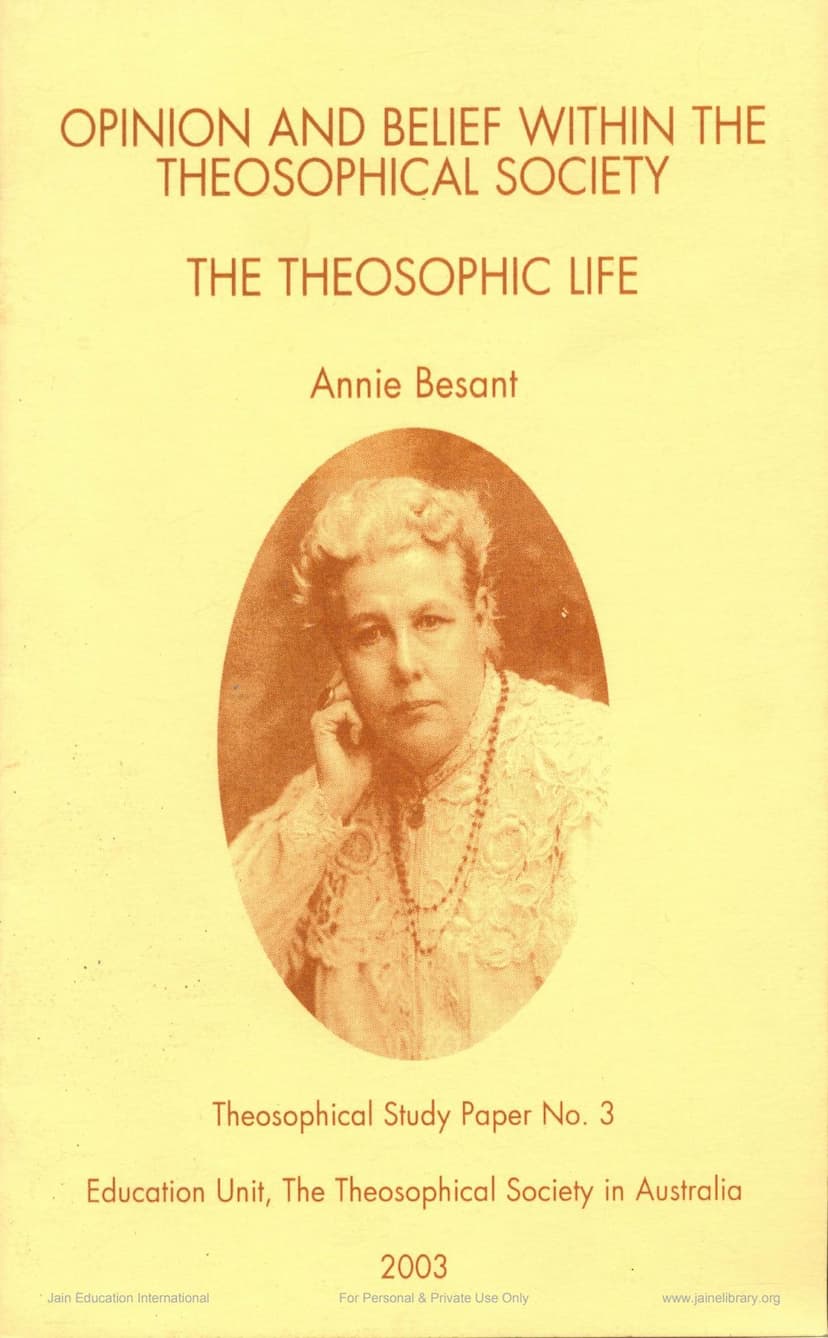Theosophical Study Paper No 03
Added to library: September 2, 2025

Summary
This document, "Theosophical Study Paper No. 03: Opinion and Belief Within The Theosophical Society" by Annie Besant, published by The Theosophical Society in Australia in 2003, explores the principles of individual thought and the application of Theosophical teachings in daily life. The paper emphasizes the importance of individual inquiry and the rejection of imposed dogma within the Theosophical Society.
Key Themes and Arguments:
- Freedom of Thought and Belief: The paper strongly asserts that the Theosophical Society (TS) is not an orthodox church with fixed creeds. Members are free to form their own opinions on all subjects outside of the core principle of Universal Brotherhood. This freedom is crucial for intellectual development, as opinions are only truly valuable when arrived at through individual effort, not by merely echoing others.
- Avoiding Fossilization: Differences of opinion are viewed as beneficial safeguards against the TS becoming rigid or "fossilized." A living spiritual body must grow and adapt, continually deepening its understanding of truth. The paper warns against "hallmarking" specific beliefs as universally true and discouraging challenges to them, as this would hinder future progress.
- Truth as a Growing Conception: The authors stress that our understanding of truth is always evolving and that current conceptions are likely to be modified as we learn more. This necessitates humility and a willingness to hold beliefs loosely, valuing the essence over rigid forms.
- The Practical Application of Theosophy (The Theosophic Life): The second part of the paper, "The Theosophic Life," focuses on how Theosophical doctrines, particularly reincarnation and karma, should inform one's daily actions.
- Reincarnation: This doctrine brings a wider perspective to life, fostering patience and a sense of calm, contrasting with the hurried nature of modern life often driven by a singular focus on the present existence. It redefines "salvation" not as an escape from an afterlife, but as the completion of the cycle of rebirths.
- Impact on Relationships: Reincarnation deepens our understanding of relationships, viewing friends as souls we've known in past lives and enemies as those to whom we owe karmic debts, presenting opportunities for resolution and liberation rather than anger or resentment.
- Circumstances of Life: It reveals that our current circumstances are precisely what is needed for our growth and evolution. Fretting or wishing for different conditions is seen as an error; instead, one should embrace the present as the optimal learning ground.
- Tolerance and Non-Judgment: Understanding reincarnation fosters infinite tolerance and patience with others, as each individual is on their own unique path of unfoldment. Judging others is discouraged, as we cannot fully comprehend their past experiences or present needs. The paper uses the analogy of music, where discords are necessary for the richness of the overall harmony.
- Karma: The paper clarifies that karma is not a predetermined fate or a lump sum imposed at birth, but a "continuing creation." It is actively shaped by our thoughts, desires, and actions in the present moment.
- Karma as a Stimulus: A proper understanding of karma should inspire effort rather than paralyze with fear. We can modify our destiny through our choices.
- Skill in Action (Yoga): The concept of "skill in action is yoga" is presented as a way to "rule our stars." This involves changing ourselves and meeting challenges from different angles, rather than being passively subjected to them. Even unavoidable destinies offer opportunities for learning and wisdom.
- Reincarnation: This doctrine brings a wider perspective to life, fostering patience and a sense of calm, contrasting with the hurried nature of modern life often driven by a singular focus on the present existence. It redefines "salvation" not as an escape from an afterlife, but as the completion of the cycle of rebirths.
- The Life of Service: The Theosophic life is fundamentally a life of service. True living is achieved by contributing to others, as we live by the sacrifice of other lives. Service is described as the great illuminator, clearing mental fog and leading to true wisdom, which is learned through living, not just studying. Serving humanity is the ultimate goal, and even small acts of service, done with love, contribute to the larger whole.
- Perfection in Detail: The paper emphasizes that greatness lies not in the scale of an act, but in the perfection of its execution. From the standpoint of the Self, all necessary actions are equally great and contribute to the perfection of the whole, much like a mosaic where each fragment has its vital place.
In conclusion, the paper advocates for a dynamic, evolving understanding of Theosophy, grounded in individual inquiry, practical application in daily life, and a commitment to service. It encourages members to live the principles they study, making their lives a testament to the wisdom they embrace.